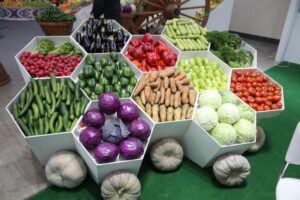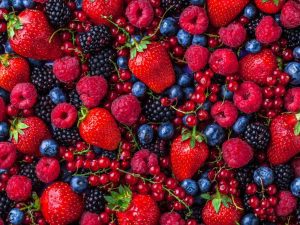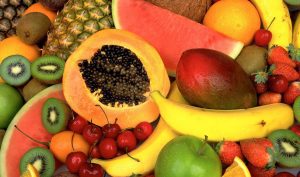
In order to further promote fruit and vegetable products in Uzbekistan, a commission for the export of fruits, vegetables and food products will be established, headed by the Prime Minister.
For this purpose, Uzbek trading houses in Germany, Hungary, Poland, Spain, the United States, and Kazakhstan will be transferred to the management of entrepreneurs.
It has been announced that new trading houses will be opened in major port cities such as Nagoya (Japan), Mersin (Turkey), Rotterdam (Netherlands), Qingdao (China), Klaipeda (Lithuania) and Doha (Qatar).
Thanks to an investment of $8 million, modern laboratories with international accreditation will be launched this year in Zangiat, Fergana, and Samarkand.
A reference laboratory will also be set up in Tashkent to ensure that private laboratories meet international standards. For these purposes, $12 million will be allocated from the World Bank. In the future, internationally recognized reagents will be exempt from customs duties and will not require a mandatory environmental certificate.
For export companies with a shortage of working capital, the Business Development Bank will provide UAH 1.5 trillion in soft loans of up to 50% of the contract amount with the farmer and the procurement warehouse. Loans will be issued at 18% per annum with a grace period of six months for a period of up to 1.5 years.
Suppliers of various fruits and vegetables will be exempt from all taxes regardless of turnover, and will now be able to work as self-employed individuals.
Thanks to the measures taken, fruit products worth USD 1 billion are expected to be exported this year. As part of regional programs, 528 projects worth $833 million will be launched.
For more details, please follow the link

In 2023-2028, Uzbekistan will implement a project to create a value chain in the fruit and vegetable industry with the participation of the Japan International Cooperation Agency (JICA).
The total cost of the project is $323 million, including:
– a loan from the Japan International Cooperation Agency (JICA) – $200 million;
– the contribution of the Republic of Uzbekistan to the Project in the form of value added tax coverage and customs duty exemptions – $58.3 million;
– contribution of Project participants (loan recipients – Project initiators) – $64.8 million.
The project is being implemented in all regions of Uzbekistan, and its implementation period is 6 years – from 2023 to 2028.
The International Center for Strategic Development and Research in Food and Agriculture under the Ministry of Agriculture of Uzbekistan has been appointed as the executive body responsible for the timely and complete implementation, coordination and management of the project.

In 2020, Ukraine exported fruit and berry products worth $238 million, which is 8% less than a year earlier, and is associated with quarantine restrictions and complication of customs procedures at the borders, the Ukrainian Agricultural Export Association (UAEA) reported on Friday.
According to the association, 92% of total exports were frozen fruits and berries ($111 million), walnuts in shell and without shell ($ 98 million), as well as apples and pears ($10 million).
According to the association, in kind, the export of walnuts decreased 41.2%, to 39,000 tonnes, and apples and pears – 64.3%, to 19,000 tonnes, at the same time, the export of frozen fruits was the maximum for the period of independence of Ukraine reaching 55,000 tonnes.
The UAEA reported that sales of Ukrainian fruits, berries and nuts to the EU countries in 2020 provided 77% of the total revenue from these products. Most of these products were bought by Poland ($57.7 million), France ($19.7 million), Germany ($17.2 million), the Netherlands ($11.6 million), Italy ($11.5 million), Austria ($11.2 million), the Czech Republic ($9.6 million) and Greece ($9.5 million). Turkey ($10.5 million) and Belarus ($9.2 million) are other major trading partners.
The association said that the average price of Ukrainian apples in 2020 grew by 1.5 times, to $500 per tonne, frozen fruits and berries – by 13.6%, to $2,023 per tonne, and shelled walnuts – by 5.1%, to $3,000 per tonne.

Many people, who have become vegetarians, risk gaining negative experience of eating poor quality seasonal fruit and vegetables, says nutrition expert Veronika Vero, who is also an author of health improvement programs.
“In my practice, I often noticed the presence of nitrates in seasonal fruit. Since vegetarians often have an increased sensitivity to tastes, such people may have a stronger reaction to nitrate-containing food than ‘omnivorous’ people,” Veronika said.
According to the expert, after long body purification, consumption of any contaminated food may cause at least an allergic reaction or even a serious poisoning. This is connected with changes in vegetarian’s metabolic processes.
“The body of a person consuming both animal and plant food can accumulate toxins for years, but finally this may cause liver cirrhosis or another serious disease. As to vegetarians, their bodies response immediately as they do not accumulate toxins,” Vero said in a program on healthy nutrition on the Expert Club YouTube channel.
She said people, who decided to become vegetarians, first of all should focus on self-improvement and self-education, because learning healthy nutrition programs is one of the most important tasks of a person, who decided to refuse from eating meat.
Veronika Vero, a vegetarian and healthy nutrition expert, spent more than eight years of training at a research and development center. She is the author of several programs, seminars, as well as physical, mental and energy retreats.
The full video is available on the Expert Club YouTube channel.
EXPERT, EXPERT CLUB, FRUIT, HEALTHY NUTRITION, MOROZOV, URAKIN, VEGETARIANISM, VERO

First Ukrainian Apples Producers aggregation platform (USPA FRUIT) jointly with USAID Competitive Economy Program in Ukraine start a joint initiative entitled “the Fruits Expansion to the Countries of the Middle East and Africa,” under which Ukrainian fresh fruit producers will receive help to enter new markets. According to a press release of the USPA FRUIT platform, under the initiative trade and economic missions for companies-members of the platform to the Middle East and Africa will be organized. Ukrainian producers will also have access to market analytics, which in the future will help them conclude deals for the supply of fresh fruits (apples, cherries, blueberries), increase export sales and create new jobs.
“Establishing stable supplies will be preceded by a detailed study of the Middle East and Africa markets, which will help USPA FRUIT identify priority exports, develop and implement pricing and marketing policies for each country in the region, which in turn will create competitive entry and consolidation in these markets. Within the project, USPA FRUIT aggregation platform organizes trade and economic missions to Egypt, Qatar and the Kingdom of Saudi Arabia, what will help to establish program supplies of fresh fruits from Ukraine,” USPA FRUIT said.
Fresh fruits from the USPA FRUIT aggregation platform have been presented in the UAE market for three years already, but there are still many opportunities for development within the markets of the Middle East and Africa.

The T.B.Fruit group of companies, the largest fruit and berry processor in Ukraine, in 2019 occupied 10% of the world juice market, increasing its share, founder of T.B.Fruit Taras Barschovsky has said.
“It was 8-9% [the share in the world juice market in 2018], depending on the season and consumption. In August, we launch a new plant in Poland, the share will increase significantly,” he told Interfax-Ukraine.
According to Barschovsky, after the launch of the plant in Poland, the group’s share in the world juice market will increase to 12-14%.
According to him, in 2019 T.B.Fruit increased juice production compared to 2018 by 10%.
As reported, T.B.Fruit on May 30, 2019 announced the start of construction of the eighth plant of the fruit and berry processing group in Brzostowiec (Poland), investments in which will amount to EUR45 million.
According to the group, its capacity for processing apples will amount to 300,000 tonnes, strawberry 10,000 tonnes, cherry some 6,000 tonnes, raspberry some 12,000 tonnes, and currant some 7,000 tonnes per year.
T.B.Fruit is a vertically integrated international group of companies with a closed production cycle (growing raw materials, processing, transportation).
The group of companies was created in July 2011 after combining all the assets of businessman Taras Barschovsky.